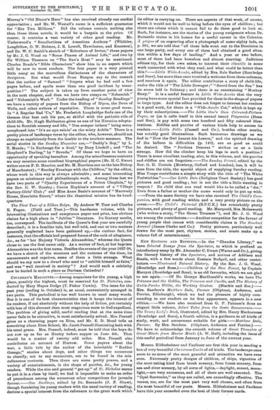CIIILDREN'S MAGAZINES. — Among magazines for the young, a high place, possibly
the highest, must be reserved for St. Nicholas, con- ducted by Mary Mapes Dodge (T. Fisher Unwin). The jeans for the past year (ending in October) is, as usual, conveniently arranged in two parts. This periodical is too well known to need many words. But it is one of its best characteristics that it keeps the interest of its readers, if not absolutely without the help of fiction, yet certainly with less of this element than most magazines seem to find expedient. The problem of giving solid, useful reading that at the same time never fails to be attractive, is most satisfactorily solved. Mrs. Pennell gives us a charming paper on Eton, and Mr. E. D. Mead tells us something about Eton School, Mr. Jacob Pennell illustrating both with his usual grace. Mrs. Pennell, indeed, mast be told that the boys do not row up as far as Henley before supper on Juno 4th. That would be a matter of twenty odd miles. Mrs. Pennell also contributes an amount of Harrow. Some papers about the war, a little tale by the author of the inimitable " Rudder Grange," stories about dogs, and other things too numerous to classify, not to say enumerate, are to be found in the mils- cellaneons contents. Then there are some pretty poems, and a variety of entertainments, in the shape of puzzles, Sm., for young readers. While the size and general "get-up" of St. Nicholas seems to put it in a class by itself, we find it impossible to make an order of precedence among the numerous other competitors for juvenile favour.—Our Darlings, edited by Dr. Bernardo (T. F. Shaw), though fornishing its young readers with the usual variety of reading, derives a special interest from the reference to the great work which its editor is carrying on. There are aspects of that work, of course, which it would not be well to briug before the eyes of children ; but there are others which it cannot fail to do them good to look at. Such, for instance, are the stories of the young emigrants whom Dr. Bernardo trains in his homes for a useful career in the Colonies. A propos of an engraving after a photograph of some eighty lade, on p. 381, we are told that "all these lads went out to the Dominion in one large party, and every one of them had obtained a good situa- tion within a few days of landing." And a year or two before, moat of them had been homeless and almost starving. Judicious editors try, for their own sakes, to interest their clientale in some work connected with what they read, and what could be better than this?—Little Wide-Awake, edited by Mrs. Sale Barker (Routledge and Sons), has more than once received a welcome from these columns, and receives it again. The editor contributes a story of child-life, under the title of "The Little Dowager ;" "Saved from the Sea" has its scene laid in Brittany ; and there is an entertaining "Monkey Story." It is a useful feature in Little Wide•Awake that the very young have some special faro provided for them in the shape of papers in large type. And the editor does not forget to interest her readers in a good work, for there is a "Wide-Awake Cot," which is kept up by their subscriptions.—The Little One's Own Coloured-Picture Paper, or (as it calls itself in this annual issue) Playmates (Dean and Son), is gay with some two hundred and fifty coloured illus- trations. Riddles and puzzles of various kinds help to amuse its readers—Little Folks (Cassell and Co.), besides other merits, has notably good illustrations. Such humorous drawings as we find in "How the Owl Learnt his Lesson," and the spirited drawing of the balloon in difficulties (p. 149), are as good as could be desired. The " Perilous Descent " strikes us as a little strange. How did the climber keep his legs in such a position ? There is some excellent reading, also, in this volume, and the puzzles and riddles are not forgotten.—The Sunday Friend, edited by the Rev. G. H. Curteis (Mowbray, Oxford and London), has, it will be seen from the title, the special object of supplying Sunday reading. Mine Yonge contributes a simple story with the title of "The White Periwinkles."—Our Little Dots (Religions Tract Society) has good pictures and good reading ; but is not the title a little wanting in respect P No child that can read would like to be called a "dot." Even from a father or mother the name would only be pat up with. —From the same Society we have also received The Child's Cons. panion, with good reading within and a very pretty picture on the coves—The Child's Pictorial (S.P.C.K.) has remarkably pretty pictures, and plenty of good reading. Mr. Macquoid, Mrs. Molesworth (who writes a story, "The Green Trousers "), and Mr. J. G. Wood are among the contributors—Another competitor for the favour of young people that comes with considerable claims is The Rosebud Annual (James Clarke and Co.) Pretty pictures, particularly well dra'wu for the moat part, rhymes, stories, and mash) make up a volume full of entertainment.























































 Previous page
Previous page